
DEBtox information
Making sense of ecotoxicity test results

Main menu
Submenu
| |
||
 DEBtox information Making sense of ecotoxicity test results |

|
|
|---|---|---|
Main menu |
Submenu |
|
DEBtox information |
DEBtox information |
|
TKTD summerschool 'DynModTox'
|
|
Previous coursesIn 2012, the first summer course "Dynamic modelling of toxic effects" was held from 11-18th of August in the Søminestationen, Holbæk, Denmark with 25 participants. The course focussed on TKTD modelling in general, and on GUTS and DEBtox in particular. Overall, the course was a success, but some changes were needed because we tried to put too much into the course (too much time was used in coding and dealing with error messages). Impressions from the 2012 course. Learning from this experience, we decided to focus on basic TK and sub-lethal effects modelling. Furthermore, we decided to offer two platforms (OpenModel next to Matlab), and provide templates and worked out examples for the exercises to facilitate the coding. In this way, the course would be useful both for the novice and the experienced coder. In 2014, we offered this summer course again (5-13 August) with 15 participants. Not in the same location but in the hostel Vandrerhjem in Roskilde, Denmark. This time, we focussed on (basic) toxicokinetics and sub-lethal effects using DEB theory (in the form of the simplified DEBkiss model). Thereby, we skipped most of GUTS. The use of OpenModel next to Matlab, and the templates for the exercises was a great success in our opinion, so we will keep this for future courses. Impressions from the 2014 course. In 2016, the third round of the course was held, again at the Søminestationen, Holbæk (9-16 August). We had a full house with 27 participants. The course basically followed the same format as in 2014, but with more freedom in the group projects (for example, some groups focussed on GUTS, and one on rats and one on duckweed). This turned out very well, so we'll build on this for the next course. Impressions from the 2016 course. We skipped the course in 2018 for personal reasons, and in 2020 we had to cancel due to the corona crisis. We offered this course again in 2021, in a slightly different format. Due to problems with openModel, we used Matlab only. However, templates were provided to make the course accessible for novice Matlab users. The course was split into an on-line pre-course and an intensive 1-week course. Due to the continuing Covid situation, the entire course was held on-line. This was of course not optimal, but better than postponing yet again. |
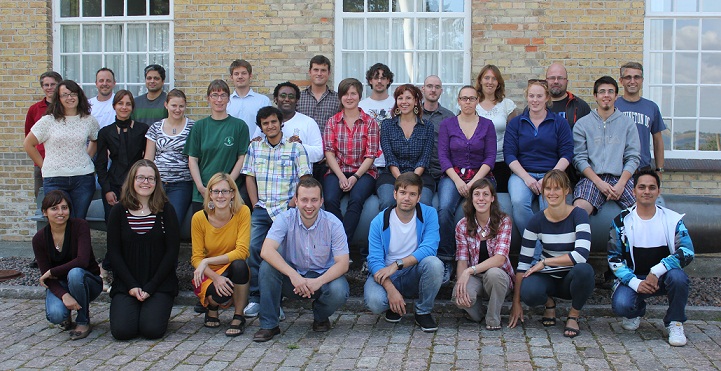 The 2012 group 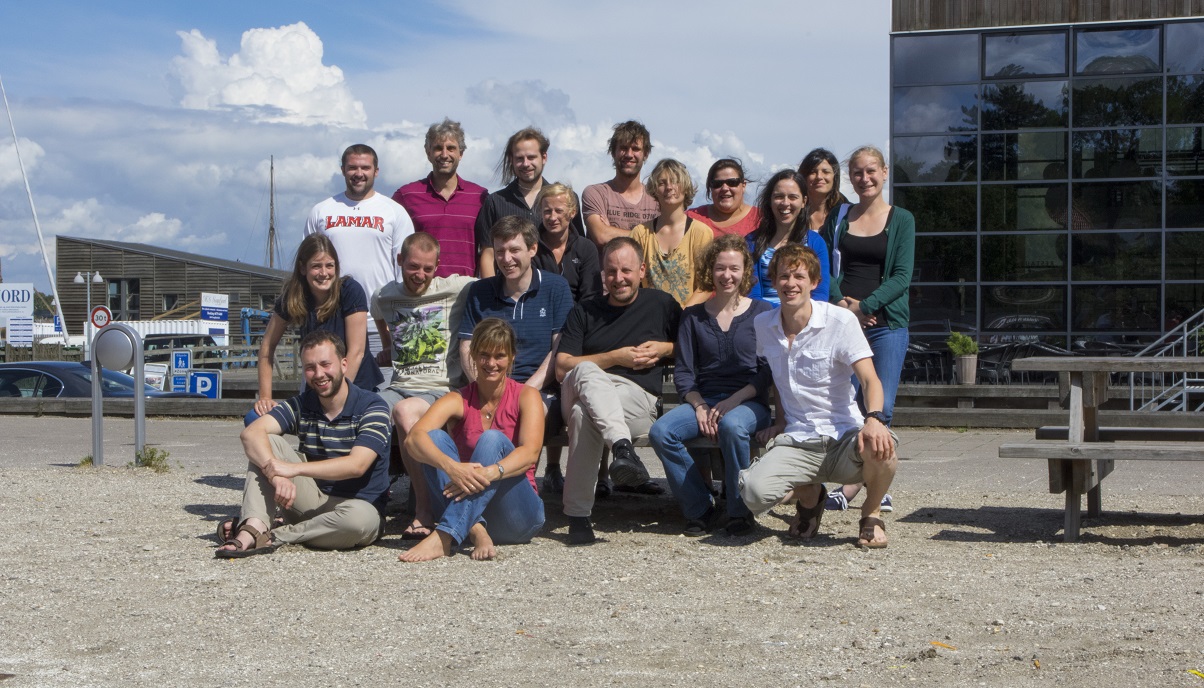 The 2014 group (minus one person) 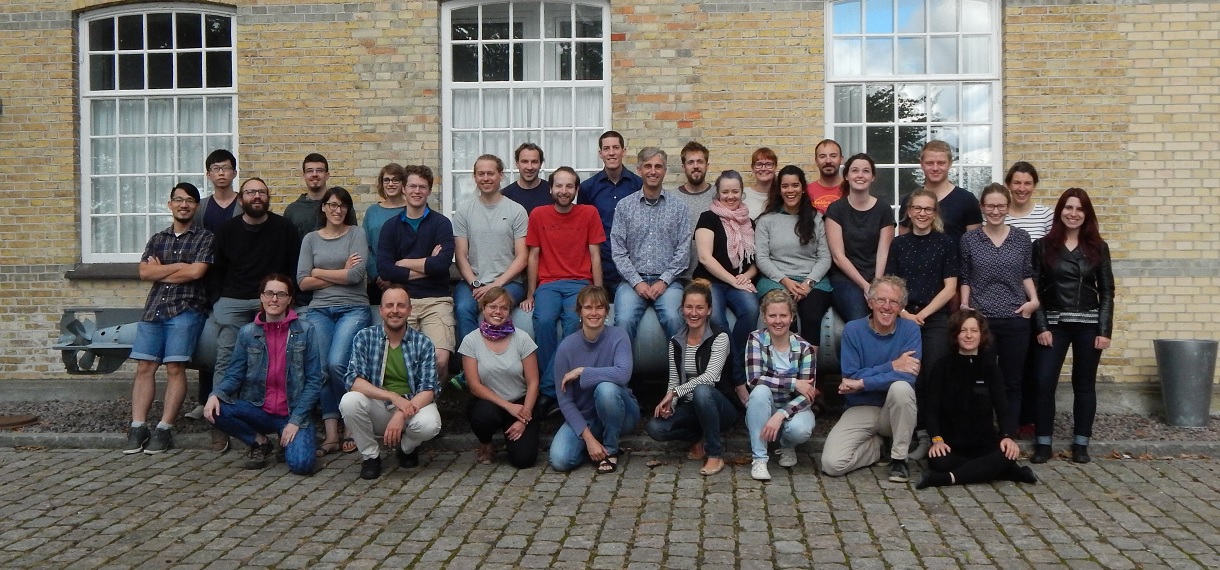 The 2016 group 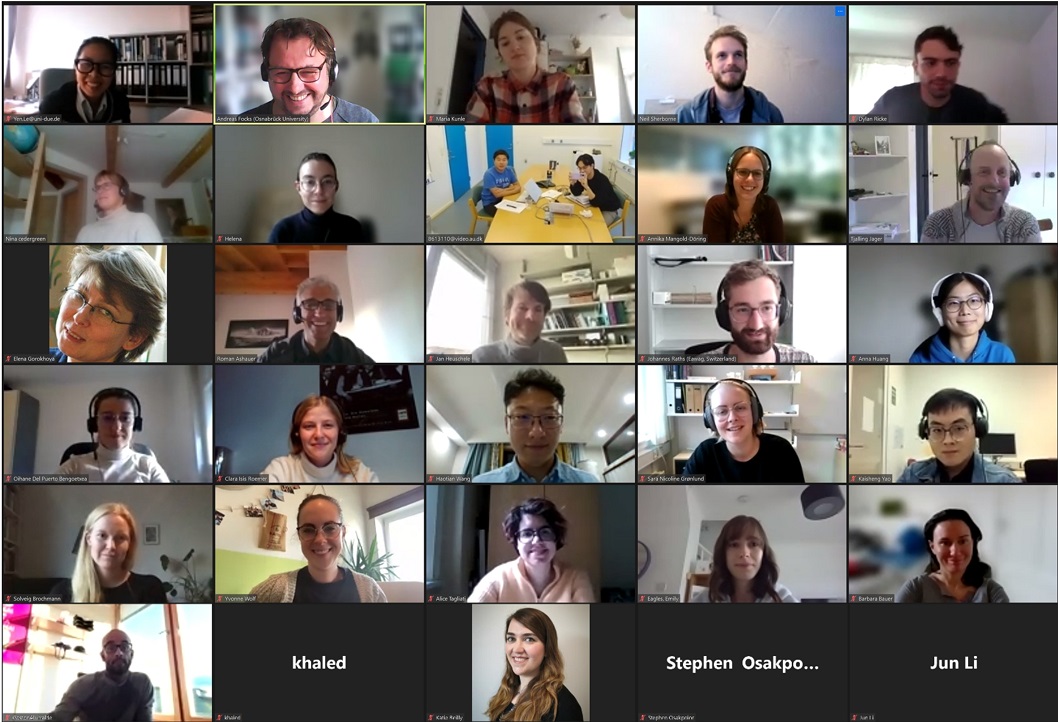 |
Course formatStarting with the 2021 course, the course contains two parts: Pre-course: On-line, we'll have 5 meetings (one afternoon a week, over 5 weeks). Each session will contain lectures by the teachers, time for questions/discussions, and explanation/feedback on homework exercises and reading materials. Before each meeting, you are asked to do homework: reading provided texts, make exercises in Matlab, and preparation of questions for the next session. This pre-course focusses on the basic skills needed for modelling, simple toxicokinetic (TK) modelling, and TKTD modelling for the endpoint survival (GUTS). It will be possible to only follow the on-line course (but not to skip the on-line course and only join the main course). Lecture topics covered in the pre-course (not exhaustive):
For those that only do the pre-course and need ECTS
credits, an assignment will be provided after the
pre-course. You will need to hand in a (short) report, to
decide if you can receive the credits. On-site in Denmark (or on-line if forced), consists of 5 consecutive full days of intensive training. In this part, the focus lies on TKTD modelling for sub-lethal endpoints (i.e., growth and reproduction) using DEB-based models. We will use the simplified DEBkiss framework here. The Matlab exercises will guide you step wise through the analysis of a rather complex life-cycle data set. Lecture topics covered in the main course (not exhaustive):
Note that we focus in this course on applications in ecotoxicology (mainly invertebrates and fish). Even though the same modelling principles are used in modelling toxicity for other organisms, we will not go into detail about how to deal with them. |
|
Software platforms, required Matlab skills
|
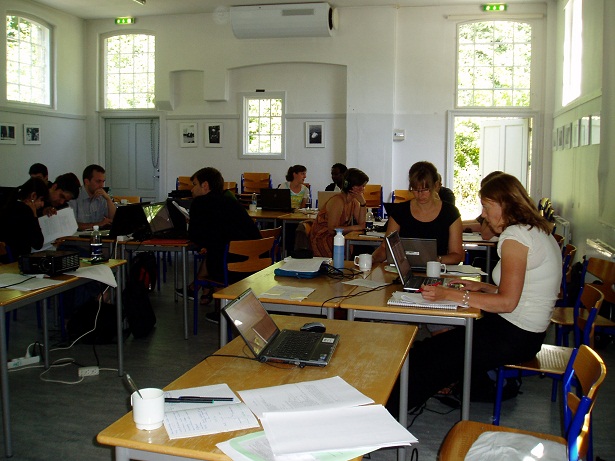 |
Math skillsThis is not a math or stats course, but it will make use of mathematics and statistics. More specifically, (systems of) ordinary differential equations (ODEs) and basic likelihood functions. It helps to have a basic working knowledge of ODEs and likelihood statistics, though we will also spend some time on these topics in the pre-course. During the pre-course, we will offer you lectures and reading material on the basics of (working with) differential equations and likelihood functions, focussing on the application to TK/TKTD modelling. We assume that you have a working knowledge of mathematical functions, powers and logarithms, derivatives and integration, and basic statistical distributions such as the binomial and the normal (e.g., bachelor-level biology). If you're math skills are rusty, this part of the course may take somewhat more time. Practice with the previous course learns that math skills are hardly ever a bottleneck for following this course. However, students with a stronger math/modelling background will, by the end of the course, be more advanced in TKTD modelling than those with a less of a quantitative background. Managing expectationsThis course deals with many aspects associated with TKTD modelling: biology, (eco)toxicology, mathematics, statistics, coding, numerical methods, etc. If you are a novice in one or more of these fields, you will not be a full-fledged TKTD modeller after this course. Furthermore, it is unlikely that you will leave this course with a finalised model for your specific species-of-interest and your data sets. However, you will leave this course with a good overview of the TKTD modelling field, hands-on experience, and improved skills on all the disciplines listed above, preparing you for more specialist courses on these topics (such as coding or math courses, or the DEB course). TeachersThe course is coordinated by Nina Cedergreen. For the 2024 course, the teaching team will furthermore consist of Andreas Focks, André Gergs and Neil Sherborne. Guest lectures may be provided by other experts. |
|